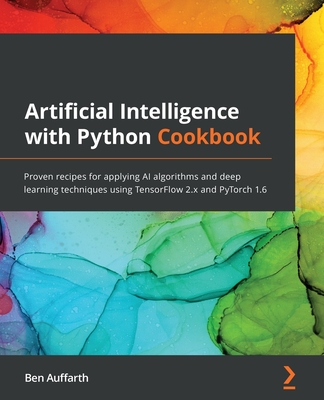Artificial Intelligence with Python Cookbook
暫譯: Python 人工智慧食譜
Auffarth, Ben
- 出版商: Packt Publishing
- 出版日期: 2020-10-30
- 售價: $1,660
- 貴賓價: 9.5 折 $1,577
- 語言: 英文
- 頁數: 468
- 裝訂: Quality Paper - also called trade paper
- ISBN: 1789133963
- ISBN-13: 9781789133967
-
相關分類:
AI Coding、Python
海外代購書籍(需單獨結帳)
相關主題
商品描述
Work through practical recipes to learn how to solve complex machine learning and deep learning problems using Python
Key Features
- Get up and running with artificial intelligence in no time using hands-on problem-solving recipes
- Explore popular Python libraries and tools to build AI solutions for images, text, sounds, and images
- Implement NLP, reinforcement learning, deep learning, GANs, Monte-Carlo tree search, and much more
Book Description
Artificial intelligence (AI) plays an integral role in automating problem-solving. This involves predicting and classifying data and training agents to execute tasks successfully. This book will teach you how to solve complex problems with the help of independent and insightful recipes ranging from the essentials to advanced methods that have just come out of research.
Artificial Intelligence with Python Cookbook starts by showing you how to set up your Python environment and taking you through the fundamentals of data exploration. Moving ahead, you'll be able to implement heuristic search techniques and genetic algorithms. In addition to this, you'll apply probabilistic models, constraint optimization, and reinforcement learning. As you advance through the book, you'll build deep learning models for text, images, video, and audio, and then delve into algorithmic bias, style transfer, music generation, and AI use cases in the healthcare and insurance industries. Throughout the book, you'll learn about a variety of tools for problem-solving and gain the knowledge needed to effectively approach complex problems.
By the end of this book on AI, you will have the skills you need to write AI and machine learning algorithms, test them, and deploy them for production.
What you will learn
- Implement data preprocessing steps and optimize model hyperparameters
- Delve into representational learning with adversarial autoencoders
- Use active learning, recommenders, knowledge embedding, and SAT solvers
- Get to grips with probabilistic modeling with TensorFlow probability
- Run object detection, text-to-speech conversion, and text and music generation
- Apply swarm algorithms, multi-agent systems, and graph networks
- Go from proof of concept to production by deploying models as microservices
- Understand how to use modern AI in practice
Who this book is for
This AI machine learning book is for Python developers, data scientists, machine learning engineers, and deep learning practitioners who want to learn how to build artificial intelligence solutions with easy-to-follow recipes. You'll also find this book useful if you're looking for state-of-the-art solutions to perform different machine learning tasks in various use cases. Basic working knowledge of the Python programming language and machine learning concepts will help you to work with code effectively in this book.
商品描述(中文翻譯)
**透過實用的食譜學習如何使用 Python 解決複雜的機器學習和深度學習問題**
#### 主要特點
- 使用實作問題解決食譜迅速上手人工智慧
- 探索流行的 Python 函式庫和工具,為影像、文本、聲音和影像構建 AI 解決方案
- 實現自然語言處理 (NLP)、強化學習、深度學習、生成對抗網絡 (GANs)、蒙地卡羅樹搜尋等技術
#### 書籍描述
人工智慧 (AI) 在自動化問題解決中扮演著不可或缺的角色。這涉及到預測和分類數據,以及訓練代理成功執行任務。本書將教你如何透過獨立且具洞察力的食譜來解決複雜問題,這些食譜涵蓋從基本到剛剛出現於研究的進階方法。
《Python 人工智慧食譜》首先會教你如何設置 Python 環境,並帶你了解數據探索的基本概念。接下來,你將能夠實現啟發式搜尋技術和遺傳演算法。此外,你還將應用概率模型、約束優化和強化學習。隨著書籍的深入,你將為文本、影像、視頻和音頻構建深度學習模型,然後深入探討算法偏見、風格轉換、音樂生成以及 AI 在醫療和保險行業的應用案例。在整本書中,你將學習到各種問題解決工具,並獲得有效應對複雜問題所需的知識。
在本書結束時,你將具備編寫 AI 和機器學習算法、測試它們並將其部署到生產環境所需的技能。
#### 你將學到什麼
- 實現數據預處理步驟並優化模型超參數
- 深入了解對抗自編碼器的表徵學習
- 使用主動學習、推薦系統、知識嵌入和 SAT 求解器
- 熟悉使用 TensorFlow 機率進行概率建模
- 執行物體檢測、文本轉語音轉換以及文本和音樂生成
- 應用群體演算法、多代理系統和圖形網絡
- 從概念驗證到生產,將模型部署為微服務
- 理解如何在實踐中使用現代 AI
#### 本書適合誰
這本 AI 機器學習書籍適合希望學習如何使用易於遵循的食譜構建人工智慧解決方案的 Python 開發者、數據科學家、機器學習工程師和深度學習實踐者。如果你正在尋找最先進的解決方案以執行各種機器學習任務,這本書也會對你有所幫助。對 Python 程式語言和機器學習概念的基本工作知識將幫助你在本書中有效地使用代碼。
作者簡介
Ben Auffarth is a full-stack data scientist with more than 15 years of work experience. With a background and Ph.D. in computational and cognitive neuroscience, he has designed and conducted wet lab experiments on cell cultures, analyzed experiments with terabytes of data, run brain models on IBM supercomputers with up to 64k cores, built production systems processing hundreds of thousands of transactions per day, and trained neural networks on millions of text documents. He resides in West London with his family, where you might find him in a playground with his young son. He co-founded and is the former president of Data Science Speakers, London.
作者簡介(中文翻譯)
Ben Auffarth 是一位擁有超過 15 年工作經驗的全端數據科學家。他擁有計算與認知神經科學的背景及博士學位,設計並進行了細胞文化的濕實驗,分析了數TB的實驗數據,在 IBM 超級電腦上運行了高達 64k 核心的腦模型,建立了處理每日數十萬筆交易的生產系統,並在數百萬份文本文件上訓練神經網絡。他與家人居住在倫敦西部,您可能會在遊樂場看到他和他年幼的兒子一起玩耍。他是 Data Science Speakers, London 的共同創辦人及前任會長。
目錄大綱
- Getting Started with Artificial Intelligence in Python
- Advanced Topics in Supervised Machine Learning
- Patterns, Outliers, and Recommendations
- Probabilistic Modeling
- Heuristic Search Techniques and Logical Inference
- Deep Reinforcement Learning
- Advanced Image Applications
- Working with Moving Images
- Deep Learning in Audio and Speech
- Natural Language Processing
- Artificial Intelligence in Production
目錄大綱(中文翻譯)
- Getting Started with Artificial Intelligence in Python
- Advanced Topics in Supervised Machine Learning
- Patterns, Outliers, and Recommendations
- Probabilistic Modeling
- Heuristic Search Techniques and Logical Inference
- Deep Reinforcement Learning
- Advanced Image Applications
- Working with Moving Images
- Deep Learning in Audio and Speech
- Natural Language Processing
- Artificial Intelligence in Production











